Although it’s theoretically possible that a team of mathematicians, horologists, and astronomers could work through the byzantine calculations necessary to predict the exact date of the Essex River Race, I prefer to rely on the time-tested folk adage: If Bob Capellini is standing on your porch holding a half-dozen home-made pizzas, it’s the eve of the race. I’d spent the last few weeks running to the front door every twenty minutes before, finally, the dinner-toting harbinger arrived. I’m not sure exactly what Roger Gocking’s subsequent appearance that evening presaged, but I wouldn’t be surprised if we had an excellent tomato harvest. Or a plague of starlings. That’s the fundamental problem with portents.
I’ve heard people say that the key to a successful Essex River Race is training. Others maintain that navigation skills are more critical, given the estuary’s shifting web of shallows. Poppycock! The next thing you know, somebody will be touting the advantages of proper stroke technique. Or of not falling out of your boat seconds before the start. No, the decisive factor to Essex performance has always been… getting a good parking spot. Having recently mastered the delicate art of securing the single best parking spot for the race (I don’t want to get into details, but let’s just say that town alderman Lionel Johnson has finally solved his “rabid possum in the mailbox” problem), I figured victory was all but assured. While everyone else was trudging back and forth to their vehicles, I’d have my feet on the dash, eating cotton candy and listening to the inspirational comedy of the immortal Nipsey Russell.
So you can imagine my horror when I learned that the race venue had shifted to the Riversbend Restaurant (“Clams so fresh, you’ll think you just harvested them yourself! Because you did. Here’s a shovel.”) at the Essex Marina. My competitive advantage wiped out! Not knowing the parking situation at the new location, our only hope was to get there Wednesday at around lunch-time and hope for the best. Maybe bring along a couple o’ possums as bargaining chips.
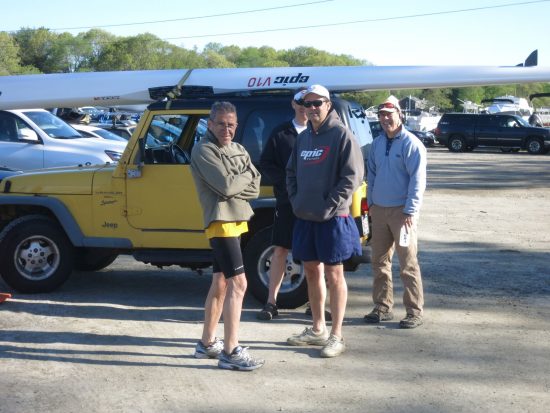
At first it’s kind of cool to have curious paddlers hanging around where you can get a close look, but eventually you get tired of them crapping all over everything. Hold on. I may be thinking of geese.
The narrow residential road leading to the marina is festooned with colorful signs warning drivers that excessive speed will not be tolerated. After nervously passing the fourth or fifth notice hinting at the kind of neighborhood vigilantism that might end up with me a foot shorter, my speedometer needle was somehow resting on empty. Just to be safe, however, I put the car in neutral, pulled back just a smidge on the emergency brake, and had Mary Beth push the last half mile.
Despite the nostalgic skepticism of traditionalists who remember when the Essex race entailed building your boat on-site and then rushing to claim the prime clamming flats, the new venue turned out to be an improvement. There was ample parking, sweeping views of the river, and better areas for milling about. Additionally, the isolated location prevented restless competitors from drifting into Essex’s many antique shops, where they’d inevitably miss the race while trying to find just the right weathervanes. Of course, progress always leaves some behind. I watched sadly as Bill Kuklinski aimlessly wandered in search of the tarring area, caulking mallet and oakum in hand.
Some people prefer to race against the best possible field, even if it means being soundly beaten by superior paddlers. That’s what motivates us to improve, they say. Those people are fools. Improving hurts. Since losing also hurts, however, we’re in a conundrum. A logical solution to this dilemma is to just avoid competing against faster paddlers. Do that and further improvement… well, that’s just showing off. So it was fortunate that Ben Piggot and Mike Dostal somehow got the impression that the race had been cancelled due to recent piranha activity on the river. And that Jan Lupinski spent the weekend quarantined due to a bubonic plague scare. And that Jesse Lishchuk was busy earning a spot on the national sprint team at the trials in Georgia (and also now appears on the no-fly list). Regrettably, Mike Florio never got the message that he needed to pick up his lottery winnings in Providence that morning. And Hugh Pritchard? Apparently he casually disregards dire fortune cookie warnings that mention him by name.
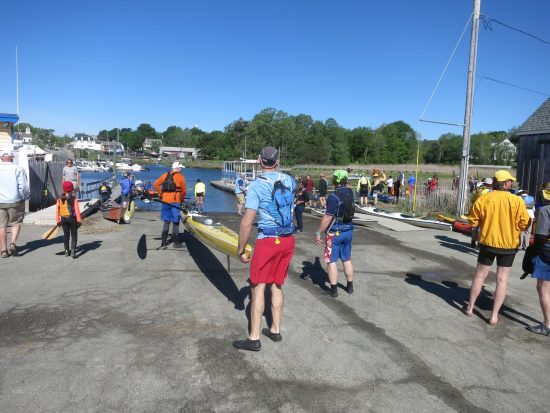
The backup at the ramp wasn’t all bad. It least it gave us extra time to work on our acts for the talent portion of the competition.
I don’t know Hugh well, but he seems a decent chap. He is soft-spoken, but an engaging conversationalist. He dresses smartly. If I were to ask you which paddler would be most likely to show up to race in a bow-tie and use the word “whomsoever”, you’d invariably guess Hugh. Then you and I would do a few minutes of cheesy “Hugh’s on first” patter and maybe ridicule his accent, because that’s the kind of shallow people we are. I like Hugh. I’m beginning to suspect, however, that Hugh may be evil. I can’t put my finger exactly on why I feel this way, but it probably has something to do with his pre-race trash-talking. Trash-talking is usually loud and coarse – the comic exaggeration is what makes it fun. But as executed by Hugh, the disparagement is so subtle and so deftly administered that you don’t even realize you’ve been mortally wounded until you look down and see the hilt of the dagger protruding from your ribs. And there he stands, an amiable smile making you wonder if you’ve imagined the whole thing. Also, I’m pretty sure I saw him strangling puppies in the parking lot.
After resolving a brief (and ironic, as it turns out) scare in which it seemed that the HPK division would be split into two heats, we were ready to race. The marina has a single boat ramp, however, necessitating a regimented launch schedule. When we finally got on the water, warm-up time was limited to a couple of brief runs under Route 133 and through the upriver marsh. With most of the field heading to the start, Tim Dwyer and I decided to do one more pass under the bridge before turning to join everyone else. Oops.
As Tim and I chatted leisurely rounding the final bend leading to the staging area, we were alarmed to see all of the other skis already arranged in starting positions up ahead. Resisting the instinct to immediately tumble out of my boat, I checked my watch. With six minutes to go until our scheduled 10:05 launch, I had plenty of time for my traditional ablution. Tim yelled out “Hey guys, wait for us!” (which, for the purposes of this report only, you should imagine as being intoned in a little brother nasal whine) and then the field was off.
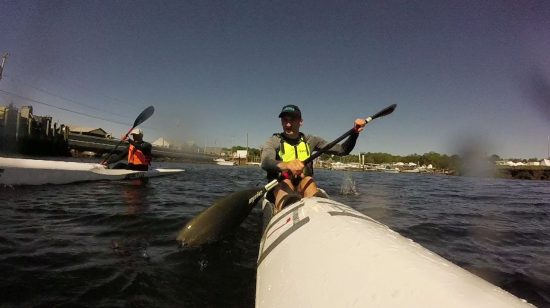
Tim and I paid a little extra for the platinum-level personalized start, but it was worth it to avoid the crowds.
We pursued. Passing the starting line around 20 seconds later, the starter yelled out that we would be awarded our own personal times. While I’ll admit that did make me feel kind of special (I was hoping for 1:32am, but I’d be happy with almost anything), I didn’t relish having to work my way through the pack in the winding, tide-narrowed river. As it turned out, however, the skis spread out fairly quickly, and holes opened up where I needed them. A few minutes into the race, I had pulled even with Kirk Olsen and Bruce Deltorchio, with a disheartening span of open water in front of us. Finally getting a chance to look more than a boat or two ahead, I could see that Hugh and Mike had a significant lead on a chase troop consisting of Chris Quinn, Matt Drayer, John Hair, and Ben Randall.
Concentrating on scoping out the front runners in the distance, it took me a few seconds to register that the red blob in the foreground was the first of the massive six man rowing boats heading back towards the finish. I angled right while Kirk and Bruce veered left, allowing the red juggernaut to continue plowing inexorably down the center of the channel. Seconds later, I heard a lot of yelling. A half-dozen boat lengths behind me, Tim Hudyncia had looked up to find himself about to be furrowed. In the resulting mayhem, he capsized, had his paddle knocked from his grasp, and weathered the salty rebukes of the rowing crew. With an assist from Chris Sherwood, Tim was able to recover his wits (and paddle) and continue racing.
Over the next five minutes I managed to reel in the chase pack. And five minutes after that I exploited a slight navigational blunder by Mike to slip into the lead. I had hoped by the time he and Hugh saw me sneak by an inside line that I’d be far enough ahead to prevent them from jumping on the draft, but that’s not how things played out. For the next mile, I had uninvited company on my stern.
Rounding the far point of Cross Island, Hugh made a bold move by cutting through rock-infested waters while Mike and I were forced to swing ridiculously wide after being caught on the wrong side of a conservative boat from an earlier heat. Continuing to hug the shore, Hugh doubled down on his boat shredding gamble, parlaying it into four length lead. A minute later, Mike tried to ride Hugh’s winning streak, cutting inside a boulder to get on his inside line, only to grind to a momentary halt on an underwater ledge. The house always wins.
A mile later, I had again caught Hugh. As we paddled side by side, he launched into what I believe may have been a rehearsed monologue. It was tough to make out over the pounding of my heart and my frequent cries of “Why, God? Why?”, so you’ll (and Hugh’ll) have to forgive me if the interpretation isn’t spot-on accurate (or even all that close). He seemed to be narrating an account of the competition in third person, with the announcer amazed that Pritchard – despite virtually no training and paddling at only 70% effort – was leading this far into the race. The color commentator then jumped in to add that flawless technique and genetic superiority doubtless were contributing factors, especially in comparison to his troglodytic “rival” (setting down his paddle to actually gesture the air quotes). Like I said, probably evil.
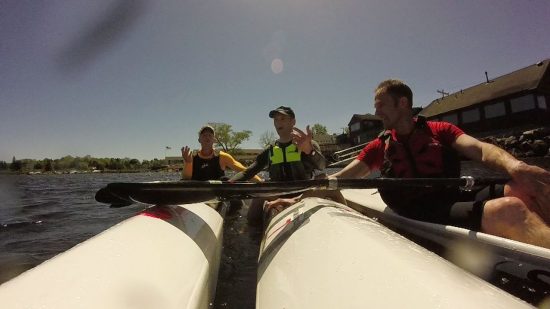
Hugh seemed entertained by our Verdi medley, but secretly he couldn’t wait to get back to his lair.
Midway through his human interest background segment (I knew about the Olympics, but single-handedly eradicating hookworms in Ghana?), I finally managed to pull safely out of earshot. I’d occasionally catch fragments of his elaborate taunt as we snaked through the Essex, but I made it to the finish before being overcome by demoralization. Hugh and Mike came through in 15 second intervals to take the other podium spots. In the women’s race, Jen Kreamer edged Mary Beth for her inaugural win of the season, with first-time racer Olga Sydorenko taking third. Bill, who has taken to retirement like a duck to a roasting pan, posted a convincing win in the SS20+ category over Ken Cooper and Bob. Another racing debutante, Karen Pischke, claimed the corresponding women’s title.
We wrapped up the day with pizza, clams, and bacon-infused corn bread provided by Riversbend. Apparently the bowls of melted butter were meant for the clams, but I found that by soaking the corn bread for a few minutes, I could cram a year’s worth of cholesterol into just a couple of bites. After a refreshingly brisk awards ceremony, a select crew of paddlers retired to an after-party at our nearby home, where we tricked them into painting our dining room.
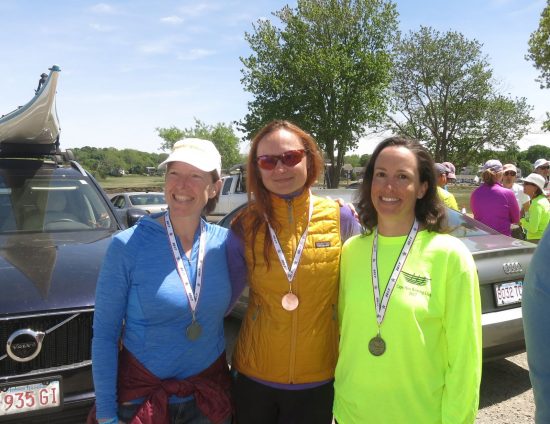
With all the fresh blood at the Essex this year – Olga, Mike, Chris Q, John, Max, and others – the piranhas were in a real lather.
With ocean temperatures now warm enough to afford you up to 90 seconds of shivering lucidity after immersion, we’ve officially completed the river racing season. So it’s on to the Sakonnet River Race! June 3. You must pre-register at PaddleGuru. Also…. If you find yourself on a Tuesday afternoon wondering how long you’d be willing to sit in rush hour traffic just to get in some gut-busting time on the ocean, why not find out? Join us at Lynch Park in Beverly for the 12th season of the confusingly named Salem League. Even if you’re not planning on being a regular, it’s a great chance to hone your racing skills and see Bill at peak grumpiness (don’t worry, we confiscated his mallet).
Special thanks to Tim H, who, for the second year in a row, perceived that I was ill-prepared to start on the Essex, and pleaded fruitlessly for a delay. That’s the kind of gesture that makes me wish I could stop making fun of his culinary choices.
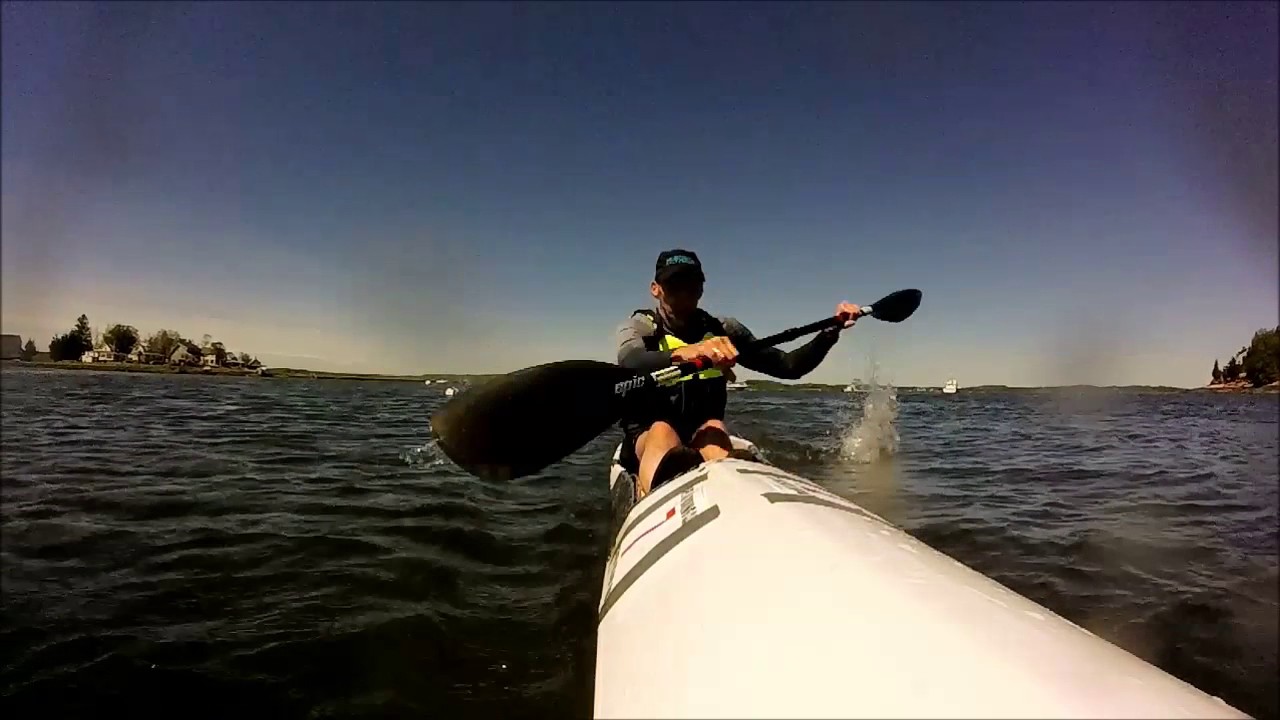
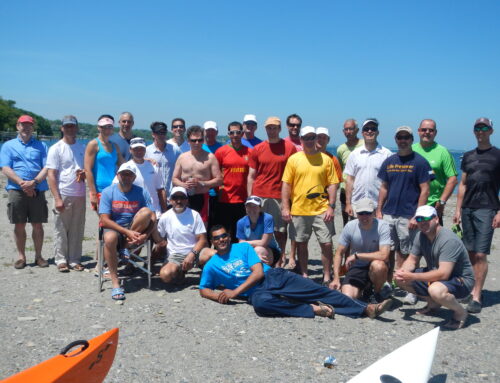
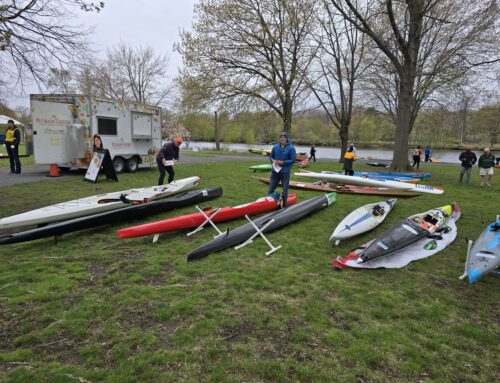
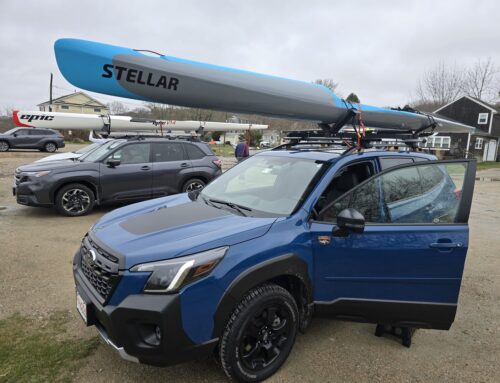
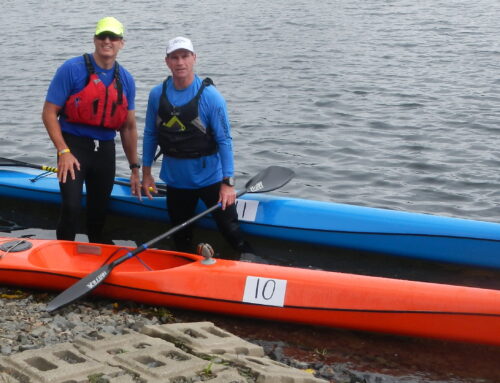
Leave A Comment
You must be logged in to post a comment.